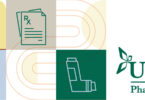For people in the Southern Tier facing a cancer diagnosis, it should be a great relief to know they can receive excellent care through UHS Oncology Services. The oncology program is in its ninth year of accreditation from the Commission on Cancer (CoC), a consortium of professionals and organizations dedicated to providing the highest quality cancer care under the auspices of the American College of Surgeons. By participating in the accreditation process, UHS has committed to adhering to quality standards in care delivery and other ways of providing for patients’ longevity and quality of life.
“There are eight different areas we focus on to maintain the accreditation,” explains Kimberly Pilarchik, director of Oncology Services for UHS. Among these are the education and credentialing of providers, education for staff, caring for patients, support and survivorship, nutrition counseling and more. “It’s an extremely comprehensive look at best practices for cancer care,” continues Ms. Pilarchik, “and one aspect of that is the yearly quality or performance improvement project.”
Going above standard care
One recent improvement focused on patients who developed lymphedema, a painful fluid accumulation in the tissues that commonly occurs after radiation therapy. In the past, it might have taken up to 30 days for patients with lymphedema to be evaluated and helped. But because of the multidisciplinary quality improvement project including physicians, lymphedema therapists and the nurse navigator, UHS significantly decreased the time between referrals and the start of therapy.
What separates our program is the way that we’re interpreting the guidelines through our ancillary and supportive care services for patients.”
— Kimberly Pilarchik, director of Oncology Services for UHS
“What separates our program is the way that we’re interpreting the guidelines through our ancillary and supportive care services for patients,” Ms. Pilarchik explains. “We’re not just clinically treating their cancer. We have a whole program and staff, including social workers, nutritionists, patient navigators and others who are helping patients understand their diagnosis. We’re educating them, offering counseling during care, and providing support groups and other supportive services.”
Patients who come to UHS Wilson Medical Center for radiation treatment or chemotherapy can access the support services available in the same location. When discussing how the CoC accreditation benefits patients, Ms. Pilarchik says, “I think what’s important to know is that the accreditation provides a framework for high-quality cancer care and that our staff members and medical teams work within that framework to constantly improve and innovate with respect to the services that we provide.”






